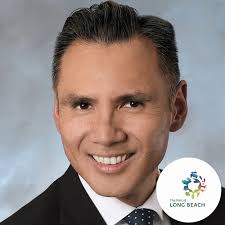Tuesday, April 7 | 11:30 a.m. | Grand Ballroom A-D
Noel Hacegaba
Deputy Executive Director, Administration and Operations, Port of Long Beach, California

Join us to hear about the Port of Long Beach and its operations—and then head for a tour of the port itself!
Noel Hacegaba, deputy executive director of administration and operations for the Port of Long Beach, California, will provide our closing plenary address. He is responsible for managing the day to day administrative and operating functions of the port including finance, human resources, real estate, business development, operations, communications and security. He was named to the post in August 2018 by the Long Beach Board of Harbor Commissioners, the port’s governing body.
More recently, Hacegaba served as the port’s managing director of commercial operations and chief commercial officer from 2014-2018. He successfully managed the port’s commercial activities during a period of significant industry realignment and led the swift recovery of its largest container terminal following the biggest bankruptcy in shipping line industry history, clearing the path for record volumes in 2017 and 2018. He also led the port’s business development, operations, customer service and security functions, and collaborated with customers and industry partners to optimize the supply chain and drive cargo growth.
Previously, Hacegaba served as in his current role in an acting capacity, managing the day to day business activities of the port. He began his career at the port in 2010 as the executive officer to the Board of Harbor Commissioners, a position that reported directly to the Board and coordinated the governing body’s policy, administrative and communications functions.
He has more than 23 years of public and private sector experience spanning a variety of industries. Prior to joining the port, he managed $200 million in contracts for a Fortune 500 company. In earlier roles, he served as a senior administrator for an elected office, a business executive for a growing company engaged in international trade, a research analyst for a policy research group and as a management consultant.
He is a graduate of the University of Southern California, where he earned degrees in economics, business administration and urban planning. He earned his doctorate in public administration at the University of La Verne, where he continues to serve on the faculty of the school's College of Business and Public Management.
Hacegaba also is a graduate of the Coro Fellows Program in Public Affairs, one of the nation's premier post-graduate fellowship programs. Additionally, he is a certified port executive (CPE) and earned the port professional manager (PPM) professional designation offered through the American Association of Port Authorities (AAPA). As part of his work in the PPM program, he authored a white paper, “Big Ships, Big Challenges: The Impact of Mega Container Vessels on U.S. Port Authorities,” which was published by AAPA and widely distributed as a reference resource within the port authority sector and the broader goods movement industry. He has written numerous other articles published in Port Technology International and the Journal of Commerce.

The Port of Long Beach
Tuesday, April 7 | 1 p.m. - 5 p.m. | Port of Long Beach
Special fee of $15 for the port tour. Bus transportation (hotel-port-hotel) will be provided.
The Port of Long Beach is the premier U.S. gateway for trans-Pacific trade and a trailblazer in innovative goods movement, safety, environmental stewardship and sustainability. As the second-busiest container seaport in the United States, the Port handles trade valued at more than $194 billion annually and supports 2.6 million trade-related jobs across the nation, more than 575,000 in Southern California.
As the industry navigates the “Big Ship Era,” the Port of Long Beach is one of the few U.S. ports that can welcome today’s largest vessels.
The Port serves 140 shipping lines with connections to 217 seaports around the world. Goods moving through the Port reach every U.S. congressional district.
The Port encompasses 3,200 acres with 31 miles of waterfront, 10 piers, 62 berths and 68 post-Panamax gantry cranes. In 2018, the Port handled more than 8 million container units, achieving the busiest year in its history.
Led by the five-member Board of Harbor Commissioners and Executive Director Mario Cordero, the Port is on track for a green future, pursuing the most aggressive capital improvement program in the nation and creating the world’s most modern, efficient and sustainable seaport. As part of an industry-leading $4 billion capital improvement program this decade, the Port is building some of the most modern, efficient and sustainable marine facilities in the world to accommodate bigger and bigger ships, while generating thousands of new jobs in the region.
The Port of Long Beach prides itself on its culture of excellent customer service and the strong relationships it maintains with industry, community, environmental advocates and partner agencies. It has received many accolades from government and industry for its landmark green initiatives, and industry leaders have named it “The Best Seaport in North America” for 19 of the past 22 years.
Closing Lecture and Tour of the Port Sponsored By:
